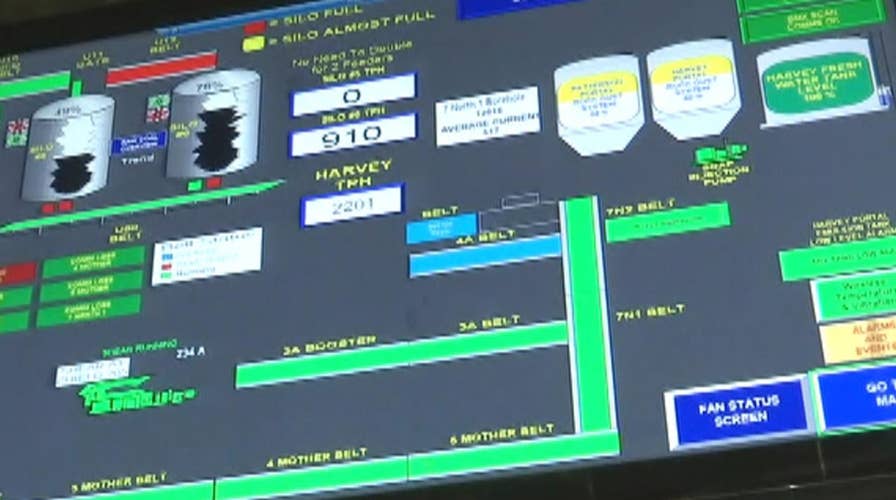Coal mining goes high tech
Companies are working to install advance systems to keep their operations online and employees safe
BOONE COUNTY, W.Va. – Deep in the heart of Appalachia's coal country, where American flags adorn nearly every porch and cell service is a luxury, residents are cautiously optimistic about President Trump's push to bring coal back.
But the road to rebuilding these hard-hit areas, quite literally, begins with roads.
Aside from the other obvious hurdles to a coal revival -- the prevalence of natural gas, advancements in renewable energy -- experts say broken bridges and country roads in places like West Virginia pose a significant problem.
“A lot of issues affect a coal revival,” John Deskins, director of West Virginia University’s Bureau of Business and Economic Research, told Fox News. “Infrastructure is certainly a part of it.”
West Virginia's identity has been linked to coal for generations. However, the steep terrain and rugged topography make West Virginia infrastructure projects expensive and technically tricky.
Most of the area developed as a result of the coal industry. Coal’s success – and its decline – has affected land use, the economy and transportation opportunities.
When the industry fell on hard times, so did its communities. Jobs were lost, people moved away, schools and hospitals shut down and efforts to fix crumbling infrastructure were put on the back burner.
According to an American Society of Civil Engineers infrastructure report, the state currently has 1,247 bridges that are “structurally deficient.” It also has 7,366 miles of public roads in “poor” condition that could cause problems for not only transporting coal but also courting new investments to the area. Trump's call for major infrastructure spending nationwide could resonate strongly here.
West Virginia’s infamous King Coal Highway, for example, is a 100-mile two-lane stretch of road connecting the state's coalfield communities to the rest of the region. Huge chunks of it are in desperate need of repair.
It’s common to see overloaded coal trucks and debris littered along the blacktop, as well as warning signs along the way.
People in the southwestern part of the state are waiting for Trump to make good on campaign promises to get coal miners back to work.
Last week, he started the process by rolling back Obama-era environmental regulations. The president ordered a review of the Clean Power Plan, which was crafted to reduce emissions from coal-fired power plants. Trump also lifted a moratorium on the sale of coal mining leases on federal lands.
COAL TOWNS SEE HOPE FOR COMEBACK AS TRUMP ENDS 'WAR'
Deskins, an associate professor of economics, says while the baseline economic forecast for West Virginia calls for short-term job losses in coal to subside, the long-term future isn’t as clear.
The coal industry is subject to considerable risk and at the mercy of the regulatory climate and conditions in the global market, he said. The Trump administration’s moves largely were seen as a morale booster for coal communities that have been pummeled by these factors -- including tough competition from cheaper forms of energy like natural gas, wind and solar.
But West Virginians say Trump’s $1 trillion infrastructure investment push would also go a long way to boosting the region.
Not only would better roads allow coal to be moved more effectively, infrastructure projects would help states like West Virginia branch out into other industries like manufacturing and tourism.
“Infrastructure and coal go hand-in-hand,” Chris Hamilton, senior vice president of the West Virginia Coal Association, told Fox News.
Yet despite Trump’s widespread promises and smiling photo ops with miners in hard hats, the fiscal 2018 budget plan the president floated last month cuts out crucial federal funding for the Appalachian Regional Commission.
The ARC is an economic development agency of the federal government that partners with 13 state governments and focuses on 420 counties across the region. It supports 500 jobs and brings in $15.7 million in earnings every year.
One of the core ARC projects is the Appalachian Development Highway System, which connects counties and promotes economic development.
The current highway system is 88 percent completed. Once done, it’s predicted to bring in 80,500 jobs and $5 billion in increased value-added production.
The ARC also has a POWER initiative that focuses on diversifying coal communities and making sure the Appalachia workforce is prepared for jobs, spokeswoman Wendy Wasserman said.
Under the Obama administration, Congress approved a $146 million budget for the agency. The money goes toward teaching coal miners how to code, develop agricultural activity on coal land and other skills.
Sunny Frothingham, a senior researcher at the liberal-leaning Center for American Progress, pointed to the proposed ARC cuts as a "betrayal" for coal country voters.
“Appalachian voters trusted President Trump to understand their needs and create good jobs – 95 percent of the counties covered by the Appalachian Regional Commission voted for him in 2016,” Frothingham said. “Cutting the ARC is an outright betrayal of Appalachian communities and would leave them without the funds to implement critical workforce, education and infrastructure projects.”
While coal has long been the heartbeat of West Virginia, “a more diverse economy is necessary in order to steer West Virginia toward a brighter economic future,” Deskins said.
No matter what the future of West Virginia is, residents will need better roads.
“Now is the time,” Gordon Lambert, McDowell County commissioner, recently told USA Today. “If we don’t get our highways this time, we won’t get them in our lifetime.”











































